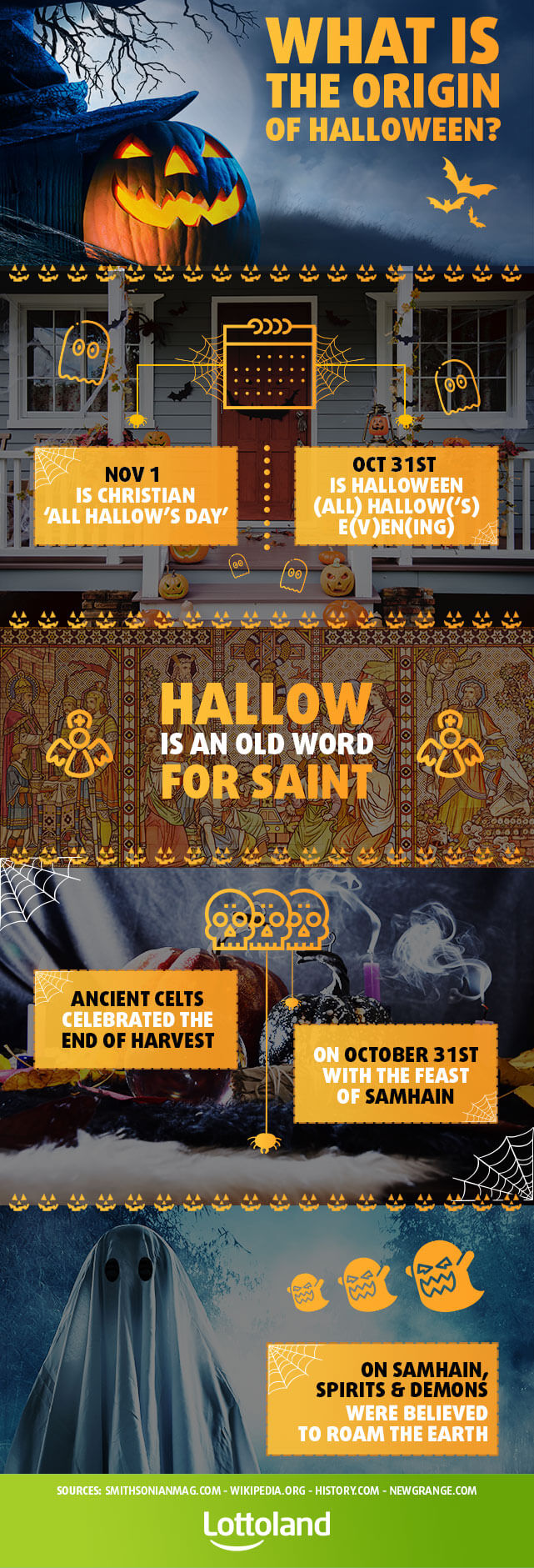Your cart is empty
Lottery 29 October 2019
Myths & Legends
What is Halloween All About?

What is the Origin of Halloween?
The Celtic festival of Samhain dates back hundreds of years and was celebrated every year on the 31st of October and 1st of November to mark the end of the harvest season in Britain and Ireland. According to the ancient Celtic religion, Samhain was a time when the barriers between our world and the Underworld could be crossed and spirits were free to roam the land. People would light bonfires to protect against evil spirits, and many other traditions which we recognise in today's Halloween celebrations also came from this time. Another example of this is the way that the Celts would dress in costumes so that the spirits or fairies would mistake them for their own kind and bring them no harm. We can trace the origins of 'trick or treating' to this period as well, because people would go door-to-door in their disguises and recite verses in exchange for food.
Samhain is pronounced 'Sow-in' , where 'sow' rhymes with 'cow'

The Meaning of Halloween
In the 9th century AD, the Christian church co-opted the festival of Samhain for their own celebration of 'All Hallows Day' on November 1st. 'Hallow' was the old word used to refer to 'Saints' and on this day - also known as 'All Saints' Day' - the lives of all known and unknown saints are celebrated. The evening before this feast day was called 'All Hallows' Evening', which over time contracted to 'Hallowe'en' or Halloween. Despite being a Christian feast, it retained many of the myths and superstitions from the time when Samhain was celebrated.
America is the 'home' of what we know as Halloween today, and many of those ancient traditions were brought over to the States by the waves of immigrants from Ireland in the 19th century.
Halloween = (All) Hallow(s) E(v)en(ing)
Where do Halloween Traditions Come From?
There are so many things we have come to associate with Halloween: witches, bats, black cats, trick or treat, bobbing for apples... but where do these spooky traditions come from? As we have seen from taking a look at the origins of Halloween, many spiritual beliefs and customs have been passed down over the centuries to form part of our modern celebrations. See if you knew where your favourite Halloween activities originated:
Bobbing for Apples: In case you are unfamiliar with this party game, it involves trying to remove bobbing apples from a bowl or bucket of water using only your teeth. This traditional Halloween game was originally brought to Britain by the invading Romans, along with the first apple trees to be introduced to the country. The game was adopted by the locals, and tradition had it that the winner of apple bobbing contests was given the honour of being the next person in the village who would be allowed to marry.
Witches: The image of the witch that we know today comes from the Earth Mother goddess who was celebrated by the Celts at Samhain. Early 'witches' were probably wise or 'wicca' women with knowledge of medicinal herbs and plants, at a time before medicines were available. As Christianity spread, so did mistrust of these healers who seemed to have 'magical' powers with which they were able to cure ailments.
Black Cats: For centuries these animals have been regarded as omens of both good and bad luck in different cultures around the world. Often they were associated with witches, sometimes believed to be 'familiars' or 'familiar spirits' which took the form of animals and acted as companions to witches. Other superstitions held that witches had the ability to transform into black cats themselves. In most parts of Europe, it is regarded as being bad luck if a black cat should cross your path.
Bats: The other animal associated with Halloween is, of course, the bat. The reason for this is not to do with vampires - at least not originally - but because of the bonfires which were set alight during the festival of Samhain to ward off evil spirits. The light attracted insects, which in turn attracted bats, leading to the connection being formed between Halloween and these nocturnal visitors.

Dressing Up: As we mentioned above, the Celts used to dress up as ghosts and demons during Samhain both as protection against evil spirits and to take part in an ancient custom similar to 'trick or treating'. As Christianity took hold in Britain, this practice evolved into something called 'souling', whereby poor children would dress up in costume and go around their neighbours' houses to collect money or food in return for saying prayers for the departed on All Souls' Day.
Ghosts in Sheets: Today, when we see somebody dressed in a sheet with eye-holes cut into it we immediately think of ghosts. In fact, this notion did not come from sightings of ghostly figures, but from the art world. Artists struggled to differentiate between living figures and ghosts in their paintings, so adopted the custom of portraying the undead as wearing a burial shroud, which bears a striking resemblance to the humble bed-sheet.
Orange & Black colours: Ask somebody to name the colours of Halloween, and 'black and orange' will be the most common response. These come from the simple association between orange and the fallen leaves of Autumn, and the deathly associations with the colour black.
Pumpkin Carving: The tradition of carving faces into pumpkins was another which arrived with Irish immigrants voyaging to America in search of a better life. In Ireland, carved turnips and large potatoes were meant to represent the legendary 'Stingy Jack', a poor man who managed to trick and out-smart the devil on three occasions. As punishment, the devil sentenced him to walk the earth at night for eternity carrying a lantern, which led to his becoming known as 'Jack o' Lantern'.
The Full Moon is often associated with Halloween, but in fact it is rare that the two coincide. The last full moon at Halloween was in 2001, and the next in 2020.
Halloween at Lottoland
Halloween comes but once a year, so make sure to enjoy a night of fiendish fun and ghostly games. Here at Lottoland we are getting in on the act with some spooky slot games, and you can try your luck on Halloween and our other favourite slots to see if you will be in for an extra treat this year!
Sources:
wicca.com
smithsonianmag.com
grammarist.com
mentalfloss.com
wikipedia.org
history.com
rd.com
bustle.com
D
by
David
Lotteries are about much more than random numbers. There are so many fascinating stories about the people who take part in lotteries, and I enjoy being able to share those stories on these pages.

